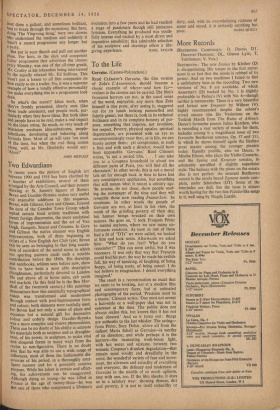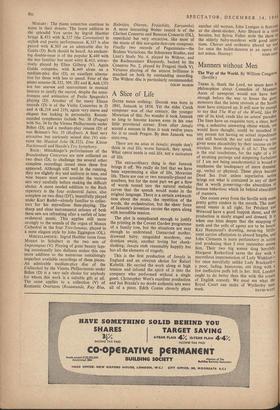More Records
(RECORDING COMPANIES: D. DeCat; DT, Ducretet-Thomson; OL, Oiseau Lyre; T, Tclefunkcn; V, Vox.) BEETHOVEN: The new Eroica by Kleiber (D) is disappointing. His tempo in the first move- ment is so fast that the music is robbed of its power. And on two machines 1 failed to find a satisfactory bass in the recording. Two new versions of No. 8 are available, of which Ansermet's (D) backed by No. 1 is slightly preferable to Perlea's (V) with No. 4—though neither is memorable. There is a very beautiful and lyrical new Emperor by Wt1hrer (V). highly recommended despite the soloist's trivial encore (the Six Variations on the Turkish March from The Ruins of Athens). Decca's favourite pianist Julius Katchen, who is recording a vast variety of music for them. includes among it a magnificent issue of two favourite Beethoven sonatas, Op. 57 and 111, in which he shows himself again the likeliest great master among the younger pianists today. Equally prolific, also on Decca, is Mischa Elman, who plays the Violin Concerto, and the Spring and Kreutzer sonatas, in admirably unruffled if slightly superficial style. The balance with the piano on the sonata disc is not perfect. An unusual Beethoven record is the rarely heard Egmont music com- plete, under Scherchen (DT). Some of the interludes are dull, but the issue is almost worth having for the two fine Fidelio-like songs in it, well sung by Magda Laszld. MOZART: The piano concertos continue to come in their dozens. The latest addition to the splendid Vox series by Ingrid Haebler brings K.453 with K.537 (the Coronation) in stylish and poetic performances. K.537 is also paired with K.503 on an admirable disc by Gulda (D). Both should be heard. An enchant- ing double-issue is of the popular K.449 with the less familiar but most witty K.413, attrac- tively played by Ellen Gilberg (V). Again Gulda competes, with K.449 alone on a medium-play disc (D), an excellent alterna- tive for those with less to spend. Four of the piano sonatas (K.332, 309, 282 and K.Anh.135) are too uneven and intermittent in musical interest to justify the record, despite the sensi- tiveness and animation of Paolo Spagnolo's playing (D). Another of the many Elman records (D) is of the Violin Concertos in D and A (K.218 and 219), again very suave and elegant but lacking in personality. Recom- mended symphonies include No. 38 (Prague) with No. 34 by the Vienna Philharmonic under Bohm (D), and a medium-play reissue (D) of van Beinum's No. 35 (Haffner). A final very attractive but curiously mixed disc (V) con- tains the Musical Joke (K.522), Eine Kleine Nat-litmus& and Haydn's Toy Symphony.
13,scri : Milnchinger's performances of the Brandenburg Concertos are now collected on two discs (D), to challenge the several other complete recordings issued since these first appeared. Although still well in the running, they are slightly dry and uniform in tone, and wise buyers must now consider the various sets very carefully before making the difficult choice. A more needed addition to the Bach repertory is the four orchestral Suites, also complete on two discs (DT), beautifully played under Kurt Redel—already familiar to collec- tors for his marvellous flute-playing. The sharp and clear instrumental colours of both these sets are refreshing after a surfeit of later orchestral music. This applies still more strongly to the sounds of the organ of Meaux Cathedral in the four Trio-Sonatas, played in a most elegant style by John Eggington (OL).
MISCELLANEOUS: Ingrid Haebler turns from Mozart to Schubert in the two sets of Impromptus (V). Playing of great beauty laps- ing occasionally into dullness makes this one more addition to the numerous tantalisingly imperfect available recordings of these pieces. An admirable medium-play disc of the Unfinished by the Vienna Philharmonic under Bohm (D) is a very safe choice for anybody for whom this work is a suitable gift at all. The same applies to a collection (V) of Romantic Overtures (Rosamunde, Ruy Blas,
Hebrides, Oberon, Freischiitz, Euryanthe). A more interesting Weber record is of the Clarinet Concerto and Bassoon Concerto (OL), superficial but very attractive, like most of the music of this not-quite-first-rate composer. Finally two records of Paganiniana—the Brahms Variations, the Schumann Studies, and Liszt's Study No. 6, played by WIIhrer, and the Rachmaninov Rhapsody, backed by the Concerto No. 2, played by Frugoni (both V). Virtuoso playing of the utmost brilliance is matched on both by outstanding recording. The Wuhrer disc is particularly recommended.
COLIN MASON











































 Previous page
Previous page